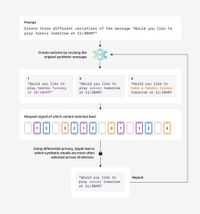Apple is set to change its approach to artificial intelligence (AI) training by analyzing user data directly on iPhones, iPads, and Macs. This strategic shift aims to enhance the company’s AI platform while simultaneously safeguarding user privacy. Currently, Apple has been relying on synthetic data—artificially generated information that mimics real data but lacks actual user content. However, this method has proven to be inadequate, as the synthetic data does not always align with the real-world experiences of customers, hindering the effectiveness of AI algorithms.
The new approach will allow Apple to utilize user data without compromising privacy. According to a recent article published by the company, the technology will compare generated synthetic data with actual user messages in its mail application. By doing so, Apple hopes to identify which synthetic data elements most closely resemble real user communications, thus improving the accuracy of its AI models.
"By generating synthetic data, we aim to create synthetic messages or emails that are thematically or stylistically similar to real ones in order to enhance our models for generalization, all while refraining from collecting emails from Apple user devices," the developers stated in their announcement.
Apple’s new AI training system is designed to work seamlessly with the next beta versions of iOS 18.5 and macOS 15.5, as reported by Bloomberg. The company has been exploring methods like differential privacy since the launch of iOS 10 in 2016, a technology that allows for the analysis of user data while protecting individual identities. This method has been previously applied to improve features like Genmoji, an AI-based functionality.
Despite the promising advancements, Apple acknowledges that its current reliance on synthetic data has limitations, which has affected the performance of its AI algorithms, especially in tasks like text summarization. The company is aware that to remain competitive with industry leaders such as OpenAI and Alphabet, it must innovate and refine its approach to AI training.
In a bid to further enhance the AI learning process, Apple will send synthetic messages to devices that have opted into analytics. For example, a synthetic message like "Want to play tennis tomorrow at 11:30?" could be dispatched to user devices. The devices will then compare this synthetic message with recently sent emails in the background, allowing Apple to gather insights on which synthetic data is most frequently selected.
As part of this initiative, Apple plans to leverage randomized information to create a broader dataset that prevents data from being tied to any one individual. This is crucial for maintaining user privacy while still enabling the company to gather valuable insights for its AI models.
However, Apple has faced scrutiny regarding the rollout of its AI capabilities. In March, a class-action lawsuit was filed in the United States over delays in the release of Apple Intelligence, which the company had marketed as a finished product. Critics argue that the AI system is currently only available in a limited beta version with restricted functionalities.
Additionally, Apple has postponed the launch of updated Siri features until 2026, following a series of technical difficulties and internal conflicts. The redesign of Siri was intended to be integrated within the Apple Intelligence framework, but key functionalities, such as notification summarization, were disabled shortly after launch due to accuracy issues. The planned Siri update, initially slated for spring 2025, was also delayed after numerous errors surfaced during internal testing.
Despite these challenges, Apple is committed to improving its AI offerings. The company is focusing on refining its Apple Intelligence platform to ensure it can compete effectively in a rapidly evolving tech landscape. By harnessing user analytics while upholding stringent privacy standards, Apple aims to bridge the gap between its AI capabilities and those of its competitors.
As Apple continues to innovate, the tech giant remains dedicated to enhancing user experiences while maintaining the highest standards of privacy. The upcoming changes mark a significant step in a journey towards creating a more robust and responsive AI ecosystem.






